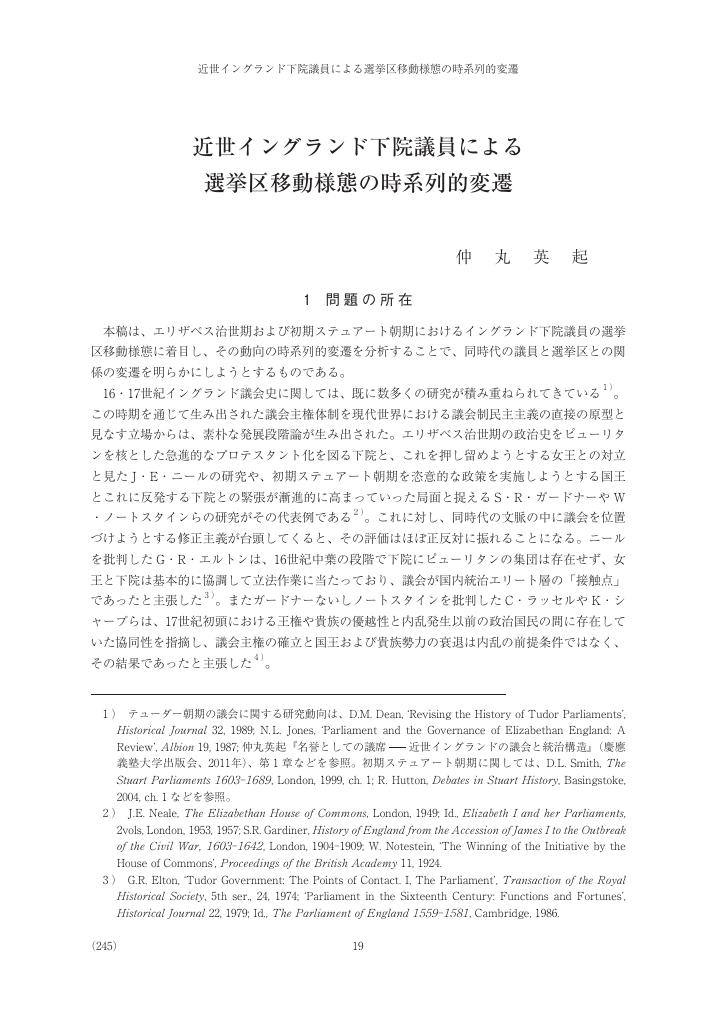2 0 0 0 IR 準男爵位の設置とその意義
- 著者
- 仲丸 英起
- 出版者
- 史学研究会 (京都大学大学院文学研究科内)
- 雑誌
- 史林 (ISSN:03869369)
- 巻号頁・発行日
- vol.98, no.6, pp.838-870, 2015-11
本稿は、準男爵位を通じて近世イングランド社会における名誉と称号の意義を再検討するものである。一六一一年、王権は財源不足の解消を目的として男爵位とナイト位の間に準男爵位を設置し、その販売を開始した。従来の研究では、初期スチュアート朝期におけるこうした爵位の販売ないし過剰な供給が、名誉の価値を低下させると同時に、社会階層間の移動を容易にしたと論じられてきた。本稿ではこの点を実証的に探求するため、準男爵位被授与者全体の社会層、およびケント・ノーフォーク両州における同称号被授与者の州内における地位を総体的に検討した。その結果、準男爵位を授与された家系の社会層は、たしかに全般的には低下傾向を示していた。その一方で、称号を保有する意味について地域的な差異が存在し、また称号の獲得は従来想定されたほどには社会階層間の流動性を促進していなかったという状況も判明したのである。In 1611, James I created the order of the baronet. However, the gentry shunned this honour from its initiation up to the Restoration. What was the reason for this? By investigating the process by which a baronetcy was established and the social strata of its purchasers, this paper re-examines the significance of titles for political society in early modern England. While some historians such as J. Aylmer and J. Brewer have studied offices sold by monarchs, there have been few studies focusing on the titles of honour. L. Stone's The Crisis of the Aristocracy, 1558-1641 is the only authoritative study on this subject. He argues that the rapid increase in conferring titles by James I and Charles I diminished their prestige and this inflation of honour helped promote social mobility. This book was written to refute the thesis by H. Trever-Roper, who criticized R.H. Tawney's idea of 'the rise of the gentry'. Later, it was shown that there were serious faults in the assumptions of both sides in the 'gentry controversy', and the dispute ended without a clear resolution. However, consideration of social strata during this period has not lost their significance. This paper will critically review Stone's assertion, focusing on the baronetcy. Since his succession to the English throne, James suffered from a lack of funds. Baronetcies were originally introduced and began to be sold to make up the deficit, but the official stated aim of this policy was to contribute to promoting the plantation of Ulster. At first, the King and his councillors intended to set the maximum number of titles at 200 to prevent their deterioration in value. However, in the 1620s, this promise was broken and peerages also began to be sold. Moreover, the original scheme of a direct cash payment of £1095 to the Exchequer was abandoned, and the virtual authority to make baronetcies was granted to courtiers to be resold. As a result, the actual lowest selling price for this title fell to about £200. We first must inquire how this downward trend in prices affected the social strata of the purchasers. The results of a survey using the Complete Baronetage edited by G.E. Cokayne shows that the social estates of families that purchased baronetcies overall began to decline. On establishment of the order, the chief purchasers were holders of knighthoods, but this trend gradually shifted to esquires. While a large proportion of early purchasers were already MPs before acquiring the title, many of those acquiring a title from 1615 to 1624 were elected MPs afterwards, and few of those who obtained one from 1626 to 1630 got parliamentary seats at some point in their lives. How did the depreciation of this title affect local communities? To examine this problem, we take up two counties, Kent and Norfolk, and investigate herald visitations and a preceding topographical survey. The result shows that although in the 1620s the status of families who were granted a title dropped according to the fall in the title's value, there was not a great social gulf between the purchasers in 1610s and those in the 1620s. The acquisition of the baronetcy enhanced mobility to a certain extent within these social strata, but it should not be imagined that acquiring a baronetcy gave esquires, let alone yeomen, a great opportunity to achieve advancement in social rank. Still, it is necessary to consider regional variations in the influence of obtaining a baronetcy. In Kent, where the conflicts among families of the gentry rarely occurred in the later 16th century, the pressure to acquire a baronetcy did not increase. On the other hand, in Norfolk, where prominent families had been struggling for power since the 1570s, more applicants aspired to the honour. This survey seems to show that situations peculiar to each region had an influence on the extent to which the social and political value of baronetcy decreased. Even if these regional differences are considered, it can be confirmed that an inflation of honour occurred on the whole. However, we cannot affirm whether this comprehensively accelerated social mobility. In the early modern period, the easier it was to obtain titles, the lower their usefulness was as a means to achieve social promotion. As a result, the inflation of honour did not necessarily give lower-status gentry a great chance to rise to a higher social position. In the long run, the establishment of a baronetcy might even have enhanced the control of the landed gentry by increasing the number of title-holders.
1 0 0 0 OA 近世イングランド下院議員による選挙区移動様態の時系列的変遷
- 著者
- 仲丸 英起
- 出版者
- 日本西洋史学会
- 雑誌
- 西洋史学 (ISSN:03869253)
- 巻号頁・発行日
- vol.248, pp.19, 2012 (Released:2022-04-27)
1 0 0 0 OA (ノート)近世イングランドにおける議会行進と礼拝式 エリザベス治世期を中心に
- 著者
- 仲丸 英起
- 出版者
- 日本西洋史学会
- 雑誌
- 西洋史学 (ISSN:03869253)
- 巻号頁・発行日
- vol.233, pp.57, 2009 (Released:2022-04-21)
1 0 0 0 OA <論説>準男爵位の設置とその意義
- 著者
- 仲丸 英起
- 出版者
- 史学研究会 (京都大学大学院文学研究科内)
- 雑誌
- 史林 = THE SHIRIN or the JOURNAL OF HISTORY (ISSN:03869369)
- 巻号頁・発行日
- vol.98, no.6, pp.838-870, 2015-11-30
本稿は、準男爵位を通じて近世イングランド社会における名誉と称号の意義を再検討するものである。一六一一年、王権は財源不足の解消を目的として男爵位とナイト位の間に準男爵位を設置し、その販売を開始した。従来の研究では、初期スチュアート朝期におけるこうした爵位の販売ないし過剰な供給が、名誉の価値を低下させると同時に、社会階層間の移動を容易にしたと論じられてきた。本稿ではこの点を実証的に探求するため、準男爵位被授与者全体の社会層、およびケント・ノーフォーク両州における同称号被授与者の州内における地位を総体的に検討した。その結果、準男爵位を授与された家系の社会層は、たしかに全般的には低下傾向を示していた。その一方で、称号を保有する意味について地域的な差異が存在し、また称号の獲得は従来想定されたほどには社会階層間の流動性を促進していなかったという状況も判明したのである。

